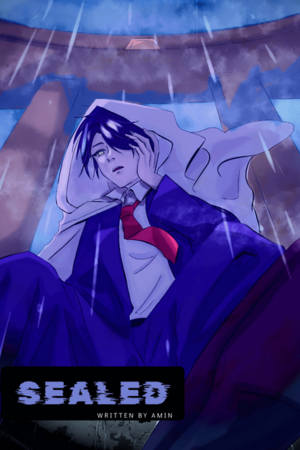Chapter 13:
EX Chapter 2 - Legend
To Return Home, I'll Save This Other World
A Recollection of Tales Attributed to Various Local Siters Compiled for General Consumption and Commentary.
The following information has been translated into Central Larisan for the sake of this compilation. - Soonsiter Ancropy
Sera's comments:
"Oh, the last book we read together was by Ancropy as well! I like his books!
What? You don't recognise the name? Well, that's because... Hmm, where do I start?
When His memories spread, Ancropy was still a student. I don't know how normal people reacted to the situation, but I think Ancropy really struggled. He changed his name to 'Arthright Crom' to sound more like an Earthling, and he even abandoned his native language!
...It must be hard to live with another person's memories."
The Lost Land of Ynn/Unn:
In a far-off village, many norths of home, I learned of a city that none believed in. The kind lady who spared time and words for my curiosity gave it the name 'Ann', to the best of what I could understand of her dialect.
In the following months, I did much studying in the nearby capital where records of conquest were kept. I was surprised to see a familiar yet unheard-of name. There it was written: 'Ynn'.
I have to admit, this wasn't a city I had heard of myself, and as my research continued, it remained an unknown. This one written record of 'Ynn' and a spoken tale of 'Ann' kept to a single village were all I could find.
The records plainly talk of plot. The armies were to march on a western city for strategic purposes; the land was beneficial to further conquest.
Thus, we turn to a kind lady's fable:
Upon successfully conquering a small neighbouring country, a group of drunken generals enjoyed a party in which the captured slaves were made to sing and dance.
When called upon, one slave sang a song of ocean tides, and soon after, the waters began to swallow the land.
The ground was flat and dry, and escape for the armored was nigh impossible. The victorious army drowned with many of the people it had claimed.
The lucky few soldiers who escaped the waves watched on with regret, as beyond the newly born sea, a country they had sought to conquer fast resettled and rose to greater heights, then set their sights upon their attacker's grounds.
I was unable to find any candidates for where this mysterious 'Ynn' may have been, yet I suspect two things:
The lady I had met, with her strange dialect and unknown tale, was surely a migrant from a foreign land.
The records I obtained, taken from our very own capital, may've been claimed from a once-conquered city of the Larilan Empire.
I only regret I hadn't given the records a closer inspection, and yet, I am young. We lack the learning to be wise, yet enough time remains to be foolish.
◇ ◇ ◇
Vaioulhorz - The fourth great ruler of Eraidus, Emperor of Rot:
While journeying through Rot, I found a puzzling yet comedic difference in our understandings of history. For you see, the Conquerer King Vailsord is known very well in our corner of the world, yet his son remains a feared unknown to us.
Should one journey to Eraideaus's streets, they would learn the fame Vaioulhorz (known to Eraidens as Vailforth) holds.
Vailforth was, needless to say, the son of Vailsord, the ruler who united the Kingdom of Eraidus during a time of civil unrest.
Born to a loving couple (the Conquerer King Vailsord as his father; attendant and Queen Laiffheim as his mother), Vailforth learned much in but a few years. He noted mundane observations within diaries from a young age, and later published them as one of the Country of Rot's defining works - The Household Book: Observations on Family.
The Household Book is known for shedding light on the feared Conquerer King's hidden heart of gold, his charming awkwardness when left alone with his Queen, as well as Vailforth's innocent but blunt comments on witnessing romance, with little understanding from the young author on what love is.
The contrast between a child's narration and the adult readership's understanding of romance has served to entertain many, as has the contrast between the then public's perception of their ruler and a child's perception of his parents.
After helping his father engineer a distribution method for a remedy to a disease originating from the country of Rot, Vailforth was given rulership over the domain.
By taking such a high-profile spot at a young age, and displaying a firm but fair rulership over Rot, he became a beloved member of the Kingdom. When Vailsord passed away, Vailforth was happily welcomed by his people.
Though his reputation at home is one of a charitable, loving man who walked the streets with his citizens, in foreign lands he was feared as a reincarnation of the God of Slow Death, Eraideaus, to which his Kingdom was named.
Attempting to uncover local history on Vailforth in the modern day will largely yield comedic comments on his parents' inability to honestly show one another affection, with anecdotes about shopping trips or celebrations.
Nothing is known about the God of Slow Death, Eraideaus, outside of being the namesake of Eraidus due to its grim, diseased land. It was presumably an old myth during the time of Vailforth, and has only been further lost to time in the millennia since.
Sera's comments:
"I really want The Household Book! If you ever see it, you have to buy it for me, okay!? I would learn another language just to read those observations."
◇ ◇ ◇
If I have one complaint about the state of historial analysis in our dreary present day, it regards those amateurs who would attempt to redefine established prose to suit one's purpose.
Case in point, The Heartless Swordsman.
I understand that this subject matter is relatively modern, but modern legends are legends all the same. I would be a fool to ignore the ever-popular Heartless Swordsman, a famous practitioner of the sword who was deprived of his emotions as punishment for insulting the gods.
With no heart to distract him, he devoted every day to honing his blade. He wouldn't hesitate, wouldn't feel guilt, wouldn't get distracted, and was undefeated 'til his death of old age. He never allowed his blade to grow empty, for its metal shone with pride.
It was a short fable, and yet, it found staggering popularity with the masses, did it not? It is widely believed to have inspired those who had, in these war-filled decades we've lived, been unfairly punished by others or by fate. To that, I ask, haven't we all?
The moral it told—that even if you lose something important, greatness can still be reached—kept our people alive when they could've so easily accepted a grimmer fate.
So why do I so often see precious paper wasted on the likes of those who never knew said pain? Rich and proper, but never real, are they? Which bumbling fool in the capital allowed these amateur authors to spin a precious, national story into one of revenge against God? Do they miss that he ('Heartless', as we all name) was, in fact, void of the emotion required to desire revenge in the first place?
It baffles the mind; they learn to write yet not to read, and in the process, create works that make me regret my own ability to read! My heart would be lighter were their papers burned before my very eyes, for then the children would be warm yet another day.
Sera's comments:
"Hmm... Maybe he was always a little bit crazy."




Please sign in to leave a comment.